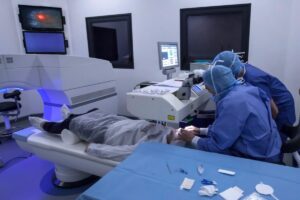Understanding Cataract Eye Surgery
Cataract eye surgery is a medical procedure aimed at removing the cloudy lens of the eye, which is caused by cataracts. The goal of the surgery is to restore clear vision, enabling patients to resume everyday activities with improved visual acuity. The procedure is typically performed on an outpatient basis, meaning that patients can return home the same day.
What is Cataract Eye Surgery?
The surgery involves several key steps, beginning with the administration of anesthesia to ensure patient comfort. The surgeon makes a small incision in the eye to access the cloudy lens. Using advanced techniques, the surgeon removes the cataract and replaces it with an artificial intraocular lens (IOL). This lens is tailored to the patient’s specific vision correction needs.
Several surgeons in Sydney have garnered recognition for their expertise and patient care in cataract surgery Sydney. These professionals have built distinguished careers and demonstrate a commitment to using the latest surgical techniques and technologies. Their dedication not only enhances the surgical outcomes but also significantly improves the overall patient experience, ensuring that individuals feel supported and informed throughout the process.
Modern cataract surgery is highly successful, with most patients experiencing significant improvements in their vision. The procedure is minimally invasive, employing advanced phacoemulsification technology to break up the cataract. This method not only reduces recovery time but also minimizes discomfort during and after the procedure. Patients often report a remarkable difference in their ability to see colors and details that were previously obscured by the cataract, leading to a renewed sense of independence and quality of life.

The Importance of Choosing the Right Surgeon
Selecting a skilled and experienced surgeon is crucial for a successful cataract surgery. The outcome of the procedure can depend heavily on the surgeon’s expertise, technique, and familiarity with the latest technologies. Patients should prioritize finding a surgeon who is board-certified and specialized in cataract surgery to ensure the highest level of care.
Additionally, a surgeon’s reputation in the medical community can also be a significant indicator of their proficiency. Seeking recommendations from primary care physicians, eye care specialists, or even past patients can provide valuable insights when choosing a surgeon. Furthermore, many surgeons offer consultations where potential patients can ask questions, discuss their concerns, and learn about the specific techniques and technologies that will be used during their surgery. This not only helps in building trust but also allows patients to feel more informed and empowered about their treatment options.
Moreover, it is essential for patients to understand the different types of intraocular lenses available, as these can significantly influence the visual outcomes post-surgery. Some lenses are designed to correct astigmatism or provide a wider range of vision, reducing the need for glasses after the procedure. Engaging in thorough discussions with the surgeon about these options can lead to a more personalized approach to care, ensuring that the chosen lens aligns with the patient’s lifestyle and visual goals.
Read about cataract removal on: How Long Does Cataract Removal Take
Key Factors to Consider When Choosing a Surgeon
Several vital factors should be assessed when looking for a cataract surgeon in Sydney. Understanding these factors will help ensure a quality surgical experience and optimal recovery. A thorough evaluation will cover the surgeon’s background, the facility’s technology, and patient feedback.
Surgeon’s Experience and Expertise
A surgeon’s hands-on experience plays an essential role in patient outcomes. It is advisable to consider a surgeon who has performed a significant number of cataract procedures. Inquire about their training, certifications, and any additional qualifications in more complex techniques if necessary.
Additionally, recent advancements in surgical methods mean that staying updated with ongoing education and training is important. Surgeons who attend workshops, conferences, and training sessions are likely to offer the most advanced and effective solutions for cataract treatment. Furthermore, it can be beneficial to ask about the types of cataract surgeries the surgeon specializes in, such as traditional phacoemulsification or laser-assisted techniques, as this can impact the precision and recovery time associated with the procedure. Read more about precision on https://manoa.hawaii.edu/exploringourfluidearth/node/777
Patient Reviews and Ratings
Patient reviews and testimonials provide firsthand insights into the surgeon’s practice and the experiences of their past patients. Websites dedicated to healthcare ratings, such as RateMDs or Healthgrades, can offer valuable feedback regarding surgeons’ skills, bedside manner, and post-operative care.
While it is essential to consider reviews as part of overall research, focusing on specific themes, such as responsiveness, communication skills, and patient outcomes, can help make a more informed decision. Additionally, seeking out personal recommendations from friends, family, or primary care physicians can provide a more nuanced perspective, as these sources often share their experiences in a more detailed and relatable manner, which can be invaluable in your decision-making process.
Hospital or Clinic Facilities
The quality of the facility where the surgery is performed is equally important. Look for hospitals and clinics that are accredited and have a reputation for excellence in eye care. Facilities with modern equipment and a clean, supportive environment can enhance the overall surgical experience.
Investigate the surgical center’s safety and infection control procedures. It is advantageous to choose a facility that prioritizes patient safety and has robust post-operative care plans in place to manage any complications effectively. Additionally, consider the availability of support services, such as counseling or rehabilitation programs, which can aid in the recovery process. A facility that offers comprehensive care, including follow-up appointments and access to specialists, can significantly contribute to a smoother recovery and better long-term outcomes for patients undergoing cataract surgery.
Top-Rated Cataract Eye Surgeons in Sydney

Surgeon Profiles and Specialties
Some of the top-rated cataract surgeons in Sydney include Dr. Ian Chen, who specializes in advanced intraocular lens implantation, and Dr. Catherine Wong, known for her patient-centered approach and expertise in complicated cataract cases. Their professional accolades reflect their dedication to providing high-quality eye care. Dr. Chen’s innovative techniques in lens implantation have allowed many patients to regain their vision with minimal recovery time, while Dr. Wong’s empathetic communication style ensures that her patients feel comfortable discussing their concerns and treatment options. Click here to read more about implantation.
Each surgeon may offer unique specialties, such as multifocal lens implants or laser-assisted cataract surgery. A thorough review of their profiles can help identify a surgeon whose expertise aligns with the patient’s specific needs or condition. Additionally, many of these surgeons are involved in ongoing research and clinical trials, contributing to advancements in cataract treatment and ensuring that their patients benefit from the latest developments in eye care.
Contact Information and Locations
Finding the right surgeon also involves practical considerations, such as location and accessibility. Most surgeons maintain dedicated practices or are affiliated with hospitals in Sydney. For example, Dr. Ian Chen is based at the Sydney Eye Hospital, while Dr. Catherine Wong operates out of the North Shore Private Hospital. These facilities are equipped with state-of-the-art technology, allowing for comprehensive pre-operative assessments and post-operative care, which are crucial for optimal recovery.
Contacting their offices directly can provide additional information about appointment availability, initial consultations, and insurance affiliation. Many surgeons also have user-friendly websites with detailed descriptions of their services and patient resources. Furthermore, prospective patients may find testimonials and reviews from previous patients helpful in making their decision, as these insights often highlight the surgeon’s approach to care, surgical outcomes, and overall patient satisfaction. This transparency can be invaluable in building trust and confidence in the chosen surgeon.
Preparing for Your Cataract Eye Surgery
Preparation for cataract surgery involves several important steps. Understanding these steps will help minimize anxiety and ensure a successful outcome. It’s recommended that patients approach this phase with a clear plan and the guidance of their healthcare provider.
Initial Consultation and Examination
The initial consultation is a crucial part of the preparation process. During this visit, the surgeon will assess the patient’s overall eye health and review the specifics of the cataract. This usually involves comprehensive eye exams, including tests to determine the degree of vision impairment and assess the shape of the eye.
This appointment is also an opportunity for patients to ask questions about the procedure, recovery expectations, and any concerns they may have. Clear communication with the surgeon ensures that the patient is knowledgeable and comfortable about the upcoming surgery.
Pre-Surgery Instructions
Before the surgery, patients will receive specific instructions to follow. These may include avoiding certain medications, particularly blood thinners, and refraining from eating or drinking after midnight before the surgery. Following the surgeon’s instructions closely helps mitigate risks and promotes a smooth procedure.
Additionally, arranging transportation to and from the surgical facility is vital, as patients may not be able to drive themselves home after the procedure. Having someone available to assist during the immediate post-operative period can also enhance recovery and comfort.
What to Expect After Cataract Eye Surgery
Recovery from cataract surgery typically begins immediately following the procedure. Understanding what to expect during the recovery phase can help patients manage their expectations and prepare for the post-surgery process.
Post-Surgery Care and Follow-up
After surgery, the initial healing period generally lasts a few days, during which patients are advised to rest and avoid strenuous activities. It’s essential to keep the eye protected during this time using sunglasses or an eye shield as directed by the surgeon.
Follow-up appointments are crucial for monitoring recovery and ensuring the surgical site is healing correctly. The surgeon will assess vision improvement and determine if prescribed eye drops or other medications are needed to prevent infection or inflammation.
Potential Risks and Complications
As with any surgical procedure, cataract surgery carries certain risks. Complications may include infection, bleeding, or swelling. While the incidence of such complications is low, being informed of these risks can help patients make educated choices about their eye health.
Patients should communicate any unusual symptoms post-surgery, such as persistent pain or changes in vision, to their surgeon immediately. Prompt reporting can lead to timely interventions, diminishing the likelihood of severe complications and ensuring a smoother recovery.

